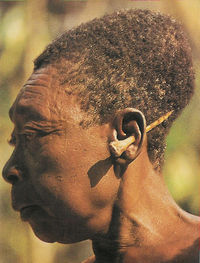Cranial Binding
When an individual is young (a baby), the skull is quite malleable. By restricting the growth of the skull and by putting selective pressure on it by binding it or strapping it against boards, its shape can be permanently altered. This is believed to be one of the first body modifications practised by humans, and can still be observed in parts of Africa and South America (most commonly Peru). Skull shaping is not effective or safe on adults.
It is believed that the shaping was done to identify the owner as a member of a certain group, but in part because Christian missionaries effectively destroyed the cultural records of most of the groups practising this activity, the specifics are very much up for debate. Some even claim that the particularly unusual skulls from Peru are evidence of alien contact ([1]).
Please note that attempting to shape your child's head is (a) dangerous, and (b) illegal, and that an adult skull can not be shaped because it has already hardened — so this modification is most likely going to disappear and be forgotten to history. That said, short of injury from the activity being mis-applied, there is no evidence that this altered brain function in any way.
It should be noted for collectors that shaped skulls are not difficult to obtain, but they are almost always of grave-robbed origins — so please realize that by trying to get these skulls you may be contributing to the desecration of graves and/or damaging archeological records.


